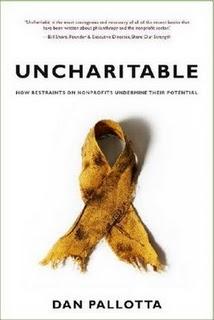Uncharitable: How Restraints on Nonprofits Undermine Their Potential

In Uncharitable, Dan Pallotta demands nothing less than a complete overhaul of the way charity is understood and expected to function. He traces America's nonprofit ideology back to the Puritans, for whom charity was a form of self-denial used to counteract and assuage their guilt about their unabashed self-serving capitalist pursuits. Ever since, he argues, charity has been kept separate from capitalism and held to different and damaging standards.
He takes issue with the fact that many standard practices at for-profit companies, the very practices that allow them to grow and succeed financially, are generally seen as off-limits to nonprofit organizations. These include paying executives market-rate salaries, taking risks, planning according to a long-term vision instead of just short-term needs, advertising prominently, and allowing investors to receive a return on their investment through the stock market. If nonprofits were permitted to engage in similar practices, he argues, they would be able to make much more money and have a much better shot at achieving their long-term goals of ending homelessness, finding a cure for AIDS, and so on.
Whether or not you agree with Pallotta's argument that the non-profit sector should have access to the tools of free-market capitalism, it's hard to deny his claim that charities are held to a double standard and often judged on the wrong criteria. The book's most persuasive chapter concerns the common donor concerns about overhead, fundraising costs, and what percentage of their donation "goes to the cause." The measure of so-called efficiency drives the assessments and ratings of influential watchdog groups like the Better Business Bureau and Charity Navigator, and often ends up completely replacing questions about what organizations are actually accomplishing through their programs. While Pallotta acknowledges that most of his visions for an improved nonprofit sector are impossible without a widespread change in ideology, something we can all start doing today is concerning ourselves with outcomes rather than percentages, and doing the most good rather than having the fewest expenses.
In case you're wondering how Pallotta's ideas would actually function in the real world, the book is supplemented by a case study of Pallotta TeamWorks, the author's company that produced AIDS Rides, breast cancer walks and other large-scale fundraising events that raised hundreds of million dollars for charity before being forced out of business by the public outcry about its unorthodox approach to fundraising. PTW came under fire for its "slick" advertising and brochures, high expenses, risks that usually succeeded but occasionally failed, and the fact that it made a profit. Amazingly, despite the huge amounts of money being raised for vital AIDS vaccine research and more, activists and news outlets consistently painted PTW as a parasite taking advantage of charities, and the company eventually lost its contracts and was forced to cease operations. Unfortunately, the result of its closure was the loss of massive amounts of charitable funding that has not since been replaced by other revenue streams.
Uncharitable is a visionary work that will change the way you think about charity, how nonprofits operate, and what they could accomplish under a different set of rules.
This sounds really great. Thanks for such a thoughtful review!